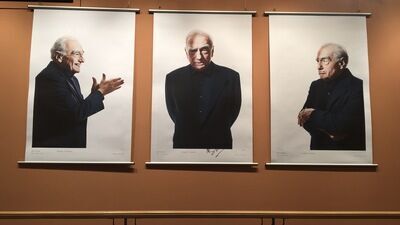Scorsese has long been instrumental in championing and restoring Powell and Pressburger’s films. (And many others’: At the tribute, Wenders called Scorsese’s Film Foundation “a Noah’s Ark of film heritage.”) But “Made in England,” which goes nearly feature by feature through their careers, is a stunning compendium that gets to the heart of what made the pair unparalleled in British cinema and so inspiring to the filmmakers of Scorsese’s generation who discovered them.
That generational transition also figures in near the end of another movie-themed documentary at Berlin, “Henry Fonda for President,” directed by the Austrian film curator Alexander Horwath. The title comes from a 1976 episode of “Maude” in which Bea Arthur’s character is determined to get Fonda, who appears in the episode as himself, drafted as a candidate for a president. The episode, Horwath’s documentary notes, aired two weeks before “Taxi Driver” opened, and the societal changes as Fonda’s Hollywood gave way to Scorsese’s are among the many subjects of this idea-rich three-hour film. (Horwath also notes that in “The Grapes of Wrath” and “Easy Rider,” Henry Fonda and Peter Fonda, his son, drove in opposite directions over the same bridge connecting Arizona and California, in a sort of visual passing of the torch.)
Broadly speaking, “Henry Fonda for President” uses Fonda as an avatar for exploring how America has viewed itself. At various times, Fonda played a future president (“Young Mr. Lincoln”), a presidential candidate (“The Best Man”), and an occupant of the oval office (“Fail Safe”). In the same year, 1957, he played characters on opposite sides of the trial system in “The Wrong Man” and “12 Angry Men.” His portraits of the Great Depression (“The Grapes of Wrath”) gave way to portraits of postwar anxiety (“Daisy Kenyon”), and eventually to “Once Upon a Time in the West,” in which Fonda could no longer be trusted to be the hero.
And in his personal life, Fonda remained committed to leftist, anti-fascist causes. Horwath, who interweaves Fonda’s biography, the story of Fonda’s family in America, and broader historical currents, is able to have Fonda to speak in his own words through audio of interviews that the actor gave in 1981 to the writer Lawrence Grobel. Fonda sometimes comes across as a cold fish. But in what amounts to the film’s thesis, Horwath says that the actor was an auteur, even if he didn’t realize it.
Accepting the honorary award, Scorsese spoke of being in conversation with other filmmakers over the years—of watching one another’s works and debating them, and of how the loneliness of making art was balanced by a feeling of community. “The work that we do individually is part of a great, ongoing, ultimately endless conversation—endless, endless and timeless,” Scorsese said. The idea that films can serve as a continuing dialogue between the past and the present permeates both documentaries.

